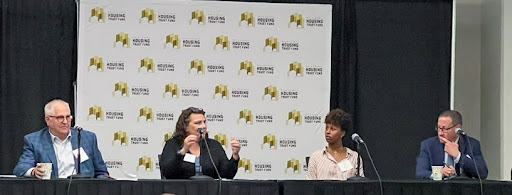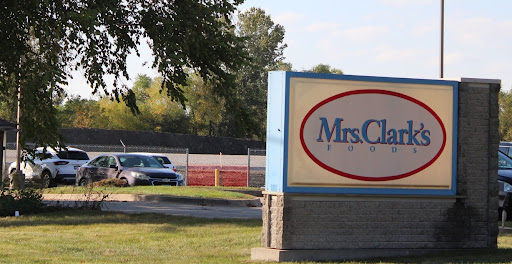Panelists share ideas for improving housing stability

KATHY A. BOLTEN Apr 11, 2022 | 7:43 pm
1 min read time
350 wordsAll Latest News, Housing, Real Estate and DevelopmentThe Polk County Housing Trust Fund’s Eric Burmeister (left) moderated a panel discussion on housing stability with Anne Bacon of Impact Community Action Agency, Amal Barre of Oakridge Neighborhood and Nate Smithberg of Iowa Legal Aid. Photo courtesy of Polk County Housing Trust Fund
Last week’s Affordable Housing Week Symposium included a panel discussion on issues related to housing stability. Eric Burmeister, executive director of the Polk County Housing Trust Fund, which sponsored the event, asked the three panelists to share an idea they had for improving housing stability for families in Central Iowa. The following are the panelists’ responses:
Anne Bacon, executive director, Impact Community Action Partnership: “Require eviction mediation. In most families, when they get a … notice on the door, they actually think they have to leave in the next 30 days. They don’t understand that there’s a process. … [Requiring eviction mediation] would help families understand the process and [have] someone help them understand the legal issue of eviction but also [help connect them] with programs in the community that can help backfill the money.”
Amal Barre, vice president for strategy and planning, Oakridge Neighborhood, and project director, unevictIA: “Providing better protections, particularly for families that live in affordable housing units. There’s a policy that is utilized in various cities across the country called ‘A Right to Return,’ which essentially provides a pathway for a household that is displaced by the closure of an existing affordable housing building for redevelopment purposes to come back once that building is … ready to be reoccupied. It creates space for them to come back to the community that they were displaced from.”
Nick Smithberg, executive director, Iowa Legal Aid: “If I were to say the one thing that I would change, it’s the very idea that eviction is the mechanism by which we deal with problems that, frankly, aren’t legal problems. These are basic needs problems.… We need to find a way to help stabilize families and put them in a place where they can keep up [financially].”
Related article: Panelists share ways to increase affordable housing supply











